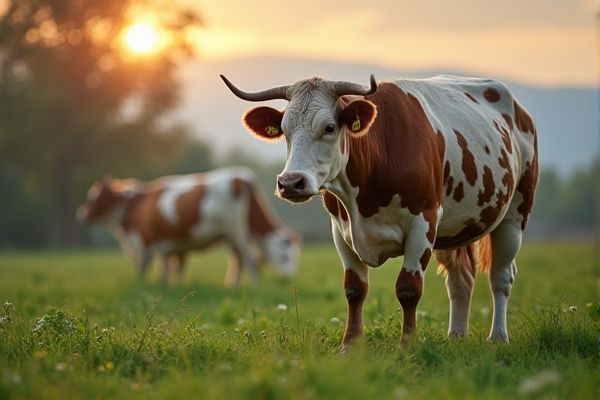
AI technology plays a transformative role in livestock farming by enhancing productivity and efficiency. Through data-driven insights, farmers can monitor animal health, optimize feeding practices, and manage breeding programs more effectively. Machine learning algorithms analyze patterns and predict diseases, enabling timely interventions that improve animal welfare and reduce mortality rates. Smart sensors and IoT devices provide real-time information on environmental conditions, helping farmers create optimal living conditions for their livestock.
AI usage in livestock farming
Precision Livestock Farming
AI usage in livestock farming, particularly in Precision Livestock Farming, allows for enhanced monitoring of animal health and productivity. Sensors and data analytics can provide real-time insights, potentially leading to more efficient feeding practices. This technological approach may result in better resource management, reducing costs for farmers. With institutions like the University of Kentucky exploring these advancements, the potential for improved livestock welfare is significant.
Automated Feeding Systems
Automated feeding systems in livestock farming can enhance efficiency by ensuring that animals receive the right amount of nutrients at optimal times. This technology allows farmers to monitor feed usage and adjust diets based on the specific needs of different breeds, such as Angus cattle. Such precision in feeding can potentially improve weight gain and overall health of the livestock. The implementation of AI in this context may also lead to cost savings and productivity gains for farms that adopt these systems.
Livestock Health Monitoring
AI can enhance livestock farming by enabling precise health monitoring systems. For example, sensors can track vital signs and alert farmers to potential illnesses in cattle. This proactive approach may lead to quicker interventions and improved overall herd health. As a result, farms may experience reduced veterinary costs and increased productivity.
Predictive Analytics for Breeding
Predictive analytics in livestock farming can enhance breeding decisions by analyzing genetic data and environmental factors. For instance, using AI algorithms to predict the optimal breeding time can improve the health and performance of animals. The chance of increasing livestock yield can lead to higher profitability for farmers. Institutions like agricultural research centers are exploring these advanced techniques to further optimize breeding processes.
Smart Wearables and Sensors
Smart wearables and sensors in livestock farming offer the potential for improved animal health monitoring and management. These technologies can track vital signs and behavior patterns, allowing farmers to identify issues early and optimize feeding practices. For instance, the implementation of IoT sensors can lead to better resource allocation and increased productivity in operations like dairy farming. Ultimately, leveraging such innovations may enhance overall efficiency and profitability for farmers.
Disease Detection Algorithms
AI usage in livestock farming can enhance disease detection algorithms, providing timely identification of health issues in animals. For instance, systems that analyze data from sensors can detect early signs of illness in cattle. These advancements could significantly reduce veterinary costs and improve herd management practices. The potential for increased productivity and better animal welfare represents a notable advantage for farmers adopting these technologies.
Supply Chain Optimization
AI usage in livestock farming can enhance productivity by predicting animal health issues and optimizing feeding schedules. For instance, precision farming practices can lead to better management of feed and resources, resulting in cost savings. Implementing AI algorithms in supply chain optimization may reduce waste and improve the efficiency of transporting livestock products. This technology could provide a competitive edge to institutions like agricultural research centers focused on advancing sustainable farming practices.
Environmental Monitoring
AI usage in livestock farming can enhance animal health monitoring and optimize feeding schedules, potentially leading to improved productivity. For instance, systems like precision livestock farming leverage AI for real-time data analysis, which can indicate health issues before they become serious. Environmental monitoring can benefit from AI by predicting weather patterns and analyzing soil health, helping farmers make informed decisions. These advancements present opportunities for increased efficiency and sustainability in agricultural practices.
Feed Optimization Models
AI usage in livestock farming can enhance feed optimization models, potentially leading to increased efficiency and lower costs. By analyzing nutrient requirements and animal behavior, AI can fine-tune feeding regimens for different species, such as cattle or poultry. The implementation of such technology may improve overall livestock health and productivity. This approach allows farmers to adapt quickly to changing market demands and resource availability.
Behavioral Analysis Tools
AI usage in livestock farming can enhance operational efficiency by predicting livestock health based on behavioral analysis tools. Implementing these tools may lead to better management practices and reduced veterinary costs. For example, sensors can monitor animal movement and feeding patterns, offering insights into their well-being. Such advancements present a significant opportunity for farms to optimize productivity and improve animal welfare.
 techknowy.com
techknowy.com